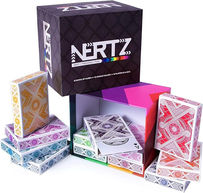This post contains affiliate links. For more information, see our disclosures here.
Official Pinochle Rules
Pinochle is a classic trick-taking and melding card game for two teams of two players (partnership Pinochle) or individual players (cutthroat Pinochle). It involves strategic bidding, card combinations (melds), and skillful play to win tricks and score points. Here's a breakdown of the rules:
Components and Objective
Number of Players:
Partnership Pinochle: 4 players in teams of two (partners sit opposite each other).
Cutthroat Pinochle: 3-5 individual players.
What you'll need:
Deck of 48 cards (two standard decks without jokers)
Pinochle score sheet (optional)
Card Ranking (High to Low):
Ace (highest)
10
King
Queen
Jack
9 (lowest)
Objective:
The goal is to be the first team (partnership) or individual player (cutthroat) to reach a predetermined score (usually 150 points). You score points by:
Winning tricks: Each trick is worth one point.
Melding cards: Creating specific card combinations during your turn scores bonus points.
Setup
3. Cutthroat Pinochle: Deal 15 cards to each player (5 rounds of 3 cards).
1. Shuffle the Deck: Shuffle the deck thoroughly.
2. Deal the Cards: Depending on the number of players, deal cards as follows:Partnership Pinochle: Deal 12 cards to each player (3 rounds of 4 cards).
4. Bidding (Partnership Pinochle Only): In partnership Pinochle, players bid on the minimum number of points they think their team can score. Bidding starts with the dealer's left and continues clockwise. Players can pass, raise the previous bid, or accept the current bid. The winning bidder chooses the trump suit (a suit that outranks all other suits in a trick).
5. The Widow (Cutthroat Only): In cutthroat Pinochle, after dealing, three cards are dealt face down in the center of the table as the "widow." The highest bidder gets the first opportunity to claim the widow by discarding three cards from their hand and taking the widow cards face up into their hand.
Gameplay
The player to the left of the dealer leads the first trick by playing any card face up. Subsequent players must follow suit if possible (play a card of the same suit led). If they can't follow suit, they can play any card, including trump. The highest card of the led suit, or the highest trump played, wins the trick. The winner of the trick collects the played cards and leads the next trick.
Melding Cards (Optional):
During your turn, before playing a card to a trick, you can declare and meld specific card combinations for bonus points. Melds are placed face up on the table and remain there for the rest of the game. Here are the common melds:
Marriage: A King and Queen of the same suit (40 points)
Double Run: Three consecutive cards of the same suit (points vary based on the rank of the middle card)
Pinochle: Two Queens of Spades (60 points)
Playing Tricks:
Players must follow suit if able.
If unable to follow suit, a player can trump (play a card of the trump suit).
The highest card of the led suit or the highest trump played wins the trick.
The winner of the trick leads the next trick.
Scoring:
Tricks: Each trick won is worth one point.
Melds: Points scored for melds are added to your team's or individual score.
Partnership Pinochle: If the bidding team reaches or exceeds their bid total, they score all the points they won. If they fall short of their bid, they are "set back" the amount they underbid.
Cutthroat Pinochle: The player with the most points at the end of the round wins that round.
Winning the Game
The game ends when a team (partnership) or individual player reaches the predetermined score (usually 150 points).
Notes/Variations
Pinochle can have variations in rules depending on the region or who you play with. Refer to any specific house rules if playing with a familiar group.
Some versions might include additional melds or scoring variations.
Strategic bidding, meld declaration, and skillful trick-taking are crucial aspects of winning Pinochle.
This is a basic overview of Pinochle rules. Enjoy this classic game of melding and trick-taking!










